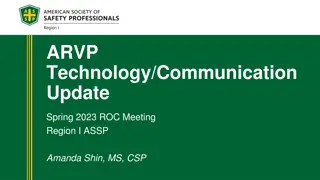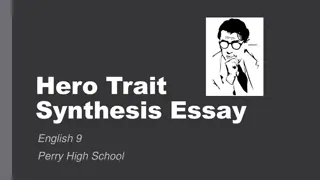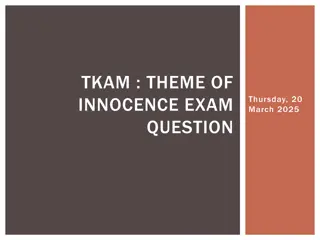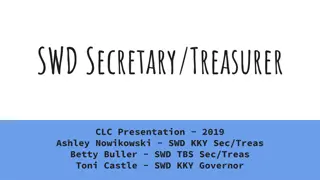
Insights from Chapters 16-19 of To Kill a Mockingbird
Explore key themes including maturity, allusions, societal attitudes, and courtroom drama in chapters 16-19 of To Kill a Mockingbird. Witness character growth, societal critiques, and poignant moments that shape the narrative as Scout navigates the complexities of her world.
Uploaded on | 2 Views
Download Presentation

Please find below an Image/Link to download the presentation.
The content on the website is provided AS IS for your information and personal use only. It may not be sold, licensed, or shared on other websites without obtaining consent from the author. If you encounter any issues during the download, it is possible that the publisher has removed the file from their server.
You are allowed to download the files provided on this website for personal or commercial use, subject to the condition that they are used lawfully. All files are the property of their respective owners.
The content on the website is provided AS IS for your information and personal use only. It may not be sold, licensed, or shared on other websites without obtaining consent from the author.
E N D
Presentation Transcript
TKAM Chapter 16, 17, 18, and 19
Chapter 16, question 1 and 2 1. How did Jem's behaviour toward Scout show his growing maturity? Jem knew that Scout was upset, so he took her into his room to sleep. He tried to reassure her that it would all be over soon. 2. Explain the reference to William Jennings Bryan. This is an allusion to a man who was a lawyer and political leader who was considered by many to be the best American orator ever. He had strong liberal beliefs and supported many liberal causes and was instrumental in creating reform in many areas such as women's suffrage.
Chapter 16, question 3 and 4 3. Miss Maudie compared the atmosphere surrounding the trial to a Roman carnival. Why? Gladiators fighting to the death was considered to be a form of entertainment for the ancient Romans. Miss Maudie felt that it was wrong and inappropriate to make the trial into a gala event, especially since it was likely to end in the death of a man. 4. Miss Maudie used sarcasm when asking Miss Stephanie about going to the courthouse. Explain why. Miss Maudie uses irony or mockery because Miss Stephanie acted like she knew everything about the case, when in fact her information didn't come from credible sources; it came from gossip and rumours that she had heard. If she really did know all the information first-hand, she could have been called as a witness which is suggested when Miss Maudie says, " 'Better be careful he doesn't hand you a subpoena' ".
Chapter 16, question 5 and 6 5. Scout overheard a conversation among the members of the Idlers' Club. What did she learn that put a "different light on things"? Why did this confuse her? She learned that the court had appointed Atticus to defend Tom Robinson. She is upset because if she had known this, she would have used this information to defend Atticus since her interpretation is that he really didn't have a choice in the matter. Also, since the community knows that Atticus was a court appointed lawyer, it is hard for Scout to understand why everyone is so upset with him. 6. With whom did Scout, Jem, and Dill view the court proceedings? They sat with Reverend Sykes in the balcony area.
















